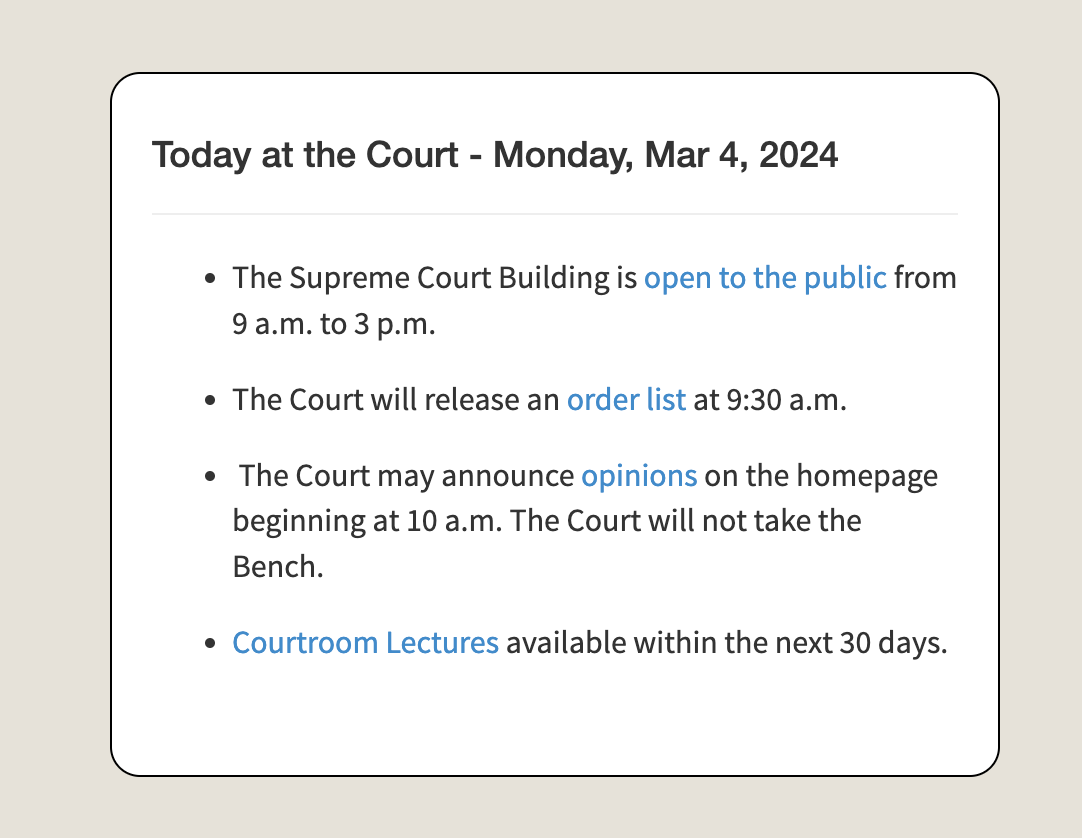The Week Ahead
March 3, 2024
On Monday morning, Trump should be going to trial in federal court in Washington, D.C.. But instead, that case, along with the one in Florida and the state case in Fulton County, Georgia, are snarled in delay. So rather than a trial that would have presented the evidence—the facts—to a jury and to the rest of the American people, this week will be mostly about politics.
Super Tuesday voting will take place this week in Alabama, Alaska, Arkansas, California, Colorado, Maine, Massachusetts, Minnesota, North Carolina, Oklahoma, Tennessee, Texas, Utah, Vermont, Virginia, and American Samoa. When you add in Idaho, Michigan, Missouri, the District of Columbia, and North Dakota, all of which held their primaries or caucuses over the weekend or will on Monday, it will be all over but the shouting for Trump by Tuesday night.
It says a lot that Republicans are willing to make him their party’s nominee despite everything that is known. Over the weekend, flanked by people in law enforcement and military uniforms, he denigrated immigrants for coming from countries and speaking languages we’ve never heard of. No one who votes for Trump can claim they don’t know what they’re buying because he talks about it every day. It’s worth noting that his wife and her parents, as well as his son Barron, all speak Slovenian.
Thursday night is the State of the Union address. We will hear first from Joe Biden and then from Alabama’s junior Senator, Katie Britt, who will give the Republican response.
It’s not all good news for Trump this week. That's because Trump has to post a bond in the E. Jean Carroll case by next weekend, or Carroll can begin to collect on her $83.3 million judgment against him. This is commonly referred to as an appeal bond. If Trump manages to either get a bond or pay the full amount of the judgment into a court account, then Carroll cannot begin efforts to collect it while the appeal is pending. If he fails to do so, her lawyer Roberta Kaplan can get to work.
Predictably, Trump asked the court to break the rules just for him, to prevent Kaplan from collecting while he contemplates filing some post-trial motions (they’re all losers). He also offered to bargain with the court over the amount of bond he’d have to post, asking for a “substantially reduced bond.” This isn’t how it works, and the court smacked down his request promptly, writing, “The Court declines to grant any stay, much less an unsecured stay, without first having afforded plaintiff a meaningful opportunity to be heard.”
Carroll’s attorneys filed their response ahead of schedule on Thursday, pointing out that Trump is asking the court to “simply trust that he’s very rich” and therefore doesn’t need to post a bond guaranteeing he’ll pay the money. But Carroll’s lawyers expressed “very serious concerns about Trump’s cash position” and the “feasibility” of him paying what he owes. They referred to him as the “least trustworthy of borrowers.” Trump’s problems don’t end there, as he still has to come up with $454 million and counting, as interest accrues daily, in the New York AG’s civil fraud case against him, where he must post a bond (called an undertaking in New York state cases) later this month if he doesn’t want her to start collecting that judgment while he appeals the case.
So now we wait. We wait on the Supreme Court. We wait on Judge Aileen Cannon in Florida, who heard arguments about when the trial in her case should take place but did not set a date. And we wait on Fulton County, where Judge Scott McAfee is still in the process of deciding whether Fani Willis should be disqualified from prosecuting the case she indicted against Trump and others. An interesting side note on that one: Judge McAfee was appointed to the bench by Georgia’s Republican Governor Brian Kemp on April 1, 2023. He was appointed to fill a vacancy and has to run for election this year. March 8 is the deadline to qualify for judicial races in Georgia, although as a practice, sitting judges frequently qualify on the first day they can, which is Monday morning. Presumably, Judge McAfee will run for reelection, which may add a whole new dimension to the past few weeks of theatrics in the Fulton County case.
The Supreme Court updated its calendar over the weekend. It will be releasing opinion(s) in cases on Monday. The Court always tells us in advance when it will release opinions, but not which cases are involved. The speculation is that this will be the decision in the 14th Amendment case out of Colorado, where voters sought to keep Trump off the bench. It has been unusual since the formal end of the pandemic for the Court not to take the bench which it announces its decisions.
This past weekend was the 59th anniversary of the Selma, Alabama, voting rights march where Black people who were peacefully protesting for their rights were brutally beaten. The protections afforded by the 1965 Voting Rights Act, passed as a direct result of the outrage over violence in Selma, made it possible for Black people to register and vote. But the Brennan Center for Justice has just released a report assessing what happened after the 2013 Supreme Court decision in Shelby County v. Holder, which gutted the protections in Section 5 of the Act, which had required jurisdictions with a history of discrimination to receive “preclearance” from either the Justice Department or a court before implementing changes in how their citizens voted. The report concluded that: “The racial turnout gap — or the difference in the turnout rate between white and nonwhite voters — is a key way of measuring participation equality. We find that the gap has consistently grown since 2012 and is growing most quickly in parts of the country that were previously covered under Section 5 of the 1965 Voting Rights Act, which was suspended by the Supreme Court in its 2013 decision in Shelby County v. Holder.” The ability to impose new, restrictive measures like identification acts, to curtail days of early voting, and to limit help with returning an absentee or mail in ballot has impacted minority voters the most. The report notes that “Recent scholarship finds that restrictive voting laws generally limit the turnout of voters of color the most,” and that “That gap costs American democracy millions of ballots that go uncast by eligible voters.”
In her dissent in Shelby County, Justice Ruth Bader Ginsburg wrote that “[t]hrowing out preclearance when it has worked and is continuing to work to stop discriminatory changes is like throwing away your umbrella in a rainstorm because you are not getting wet.” It turns out that she was right.
That’s a truly sobering thought as we look ahead to an election where every vote counts. This would be a good week to see where you can help: sign up to be a poll worker, encourage those around you to register to vote, look up your local League of Women Voters (this works for men, too!), sign up for a letter-writing campaign to voters in battleground states if you don’t live in one, or help with get-out-the-vote in your state if you do. This week is a great time to continue having conversations with other voters about the move by Republicans that led them to kill the bipartisan immigration bill in the House at Trump’s request so that he and other Republicans could continue to campaign on “the broken border,” although they could have and refused to fix it when offered the chance. If you missed that post, find it here. There is a place for each of us to ensure we remain a democracy.
We’re in this together,
Joyce




Today James Carville posted a raunchy, dark rant he called "SCROTUS" that can basically reflect the entire judicial system. They have agendas, and if you have enough lawyers and can buy the time, the loopholes are there. Each delay takes me into a deeper level of cynicism and disappointment.
Trump in a cell while having zero contact with the outside world in any way is my fondest dream. May he suffer broke and alone for what I hope will be the rest of a lengthy and miserable remainder of his life. Any of the other perquisites of a grimy penitentiary end of life will be a well-deserved bonus in paying the American people the price for what he has done to our country.